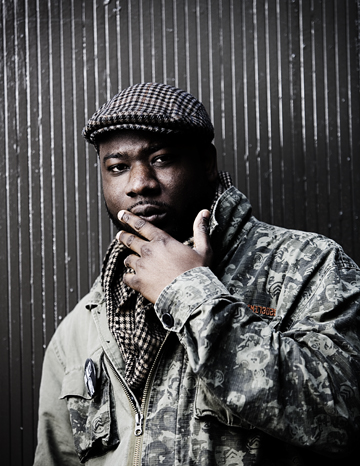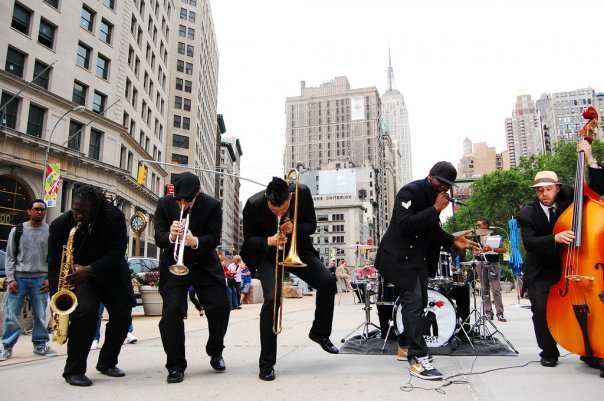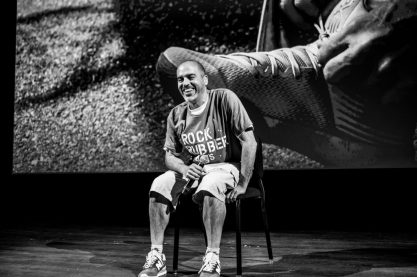Interviews
INTERVIEW: Who Is Blitz the Ambassador?

Prophet: -noun, a person for speaks by divine inspiration.
Public Enemy's "It Takes A Nation of Millions To Hold Us Back" changed my life. Listening to Chuck D made me not only want to learn more about black history, it made me want to learn more about my individual history. I've heard older folk talk about how much Alex Haley's "Roots" inspired them in so many different ways. Well, I guess my generation's "Roots" was "It Takes A Nation". But who would've known that while "It Takes A Nation" was changing my life in Philadelphia, in Accra, Ghana, it was also introducing a future prophet of rage to the hip hop culture.
Blitz the Ambassador is one of hip hop's newest voices that is actually doing like Jeru Da Damaja challenged us to do, and that's "to say something." Blitz is someone who isn't intimidated to go against the "norm" for his voice to be heard. Someone not intimidated to not only step up but to stand out against the things that are plaguing our neighborhoods, families and our youth. Someone not intimidated to blend different styles of music, so that we can all eventually see that all music is African music. Anyone who can watch his current video "Something to Believe In" and not feel that you're witnessing the future of hip hop in front of their eyes "need to wear some glasses like DMC". I got a minute to sit down and polly with Blitz the Ambassador to chop it up about music, life and what it was like to share a stage with the man that introduced him to hip hop.
I read that the album that introduced you to hip hop was Public Enemy’s “It Takes A Nation of Millions to Hold Us Back” which I think is the most powerful hip hop album ever. What did that album do for you?
At that time I was living in Ghana, so there wasn’t a lot of music that spoke truth to power at the time. If you know anything about African music, it’s a lot of celebration and it’s happy music. A few guys like Fela will bust through and speak truth to power but I had kinda grown out of local music that was played around me and I was starting to listen to hip hop so that was like a transitional time for me in general but I was always drawn to people who had something to say. So that was the first record that I was put onto that was so direct and the perception was so in your face and the subject matter, everything that was said I felt like I could relate at the time. It was something that stayed in my rotation and I got introduced to it through my older brother, so there’s where that connection came and that was something we even bonded over.
You said that at that time there wasn’t a lot of hip hop in Africa, what’s hop in Africa like now? Is it similar to the US? Or is it totally opposite?
Well, anything America exports has the ability and capacity to just overrun the world. And that’s kinda what hip hop is today. It’s the commercial stuff you hear on the radio here that is very popular in Africa as well. Now that wasn’t always the case though, cause when it started hip hop here, it was very diverse. So DJ’s in Africa they played the aspect of hip hop that was popular but that also related to us. Now, that isn’t the case. Hip Hop isn’t as diverse so DJ’s don’t have an option but to play what’s hot. So if you go to a party in Lagos they’re gonna be playing that T Pain record cause that’s what’s hot right now. But like I said that wasn’t always the case. We heard a lot of very, very dope hip hop, a lot of classic stuff and even a lot of album cuts that necessarily weren’t singles because back home we didn’t have that filter, where it is was like “here’s the single, just play the single” a DJ just found what they liked on a record and they played it.

Last year you were featured in Beyond Race magazine as one of the 50 emerging artist. How was it to get a look like that?
Man it’s a blessing. From where I’m sitting man, it’s always a dream whenever I get a look like that or whenever I get a chance to perform for an audience anywhere. It lets me know that what I’m doing is one, being noticed and number two, I’m not crazy. (laughs) You can feel alienated sometimes because I choose not to talk about certain subject matters. I choose not to have certain images in my videos and in today’s world, that’s not popular. So people look at you like “that dude’s lame” or “he don’t know what’s up”. So to get any kind of props in today’s day and age for being different or for standing out there and doing what you feel, I feel is a major thing and I’m really privileged to be in that space.
This past August, you opened for Public Enemy in NYC for Summer Stage. Being that “It Takes A Nation” was the album that put you onto hip hop, how was it opening up for PE and getting a chance to meet and talk with Chuck D?
It was beyond anything that I ever imagined as someone coming up that not only am I opening up for PE but I’m opening for PE at Summer Stage which is the premier spot in New York City over the summer. It’s close to 10,000 people watching and from that perspective alone, it’s like a dream. But more importantly I run into Chuck D backstage and he gave me the biggest hug in the world and he was like “you’re doing it, I’m proud of you”. This is a brother who just opened his heart and he recognizes what we’re attempting to do and he recognizes that we’re carrying the torch and we’re trying to take it further so that another generation will come up and be like I opened for Blitz the Ambassador and feel good that same way I felt good opening for one of my idols so that just made my entire year.
You scored the PBS documentary “A Bronx Princess”. How did that come about and how was the process different from recording an album to scoring a documentary?
I was really fortunate that I got a call from the director and producers of the doc and they were looking for somebody who was from Ghana because most of the doc was shot in Ghana and they were looking for someone who understood traditional Ghanaian high life music but also not just someone who could get stuck in that world but also find a way to bridge it with some modern day hip hop and soul. So I was fortunate enough to be in that position where they found me and they showed me the doc and as soon as they showed me the doc I was like I can relate to this because it’s about a girl, she was born in America but she has parents that are Ghanaian so it’s this world where there’s always conflict between her identity and as somebody who grew up in Ghana but lived a lot of my life in America I’m also dealing with those same identity issues as I move forward so that was a really good look for me to put all those feeling into music. And in a way it wasn’t that different from scoring the doc and writing an album like Stereotype. The difference was one, I wasn’t starting from no sample base, it was nothing, it was a blank canvas and all I had was images and scenes to paint the musical picture of what’s going on screen. So it was a whole nother challenge but I love that about music and about the opportunity to expand and do something that people around us should be doing. I don’t see why hip hop artist should not be scoring docs and movies. So that was a good opportunity and fortunately I got the band so it was a fairly easy transition working with these cats who fairly understand the way my mind works and the way the sounds that I’m looking for. So it was fairly easy to work with my band to create the soundscape.
As a hip hop artist who has studied the craft and interwoven his self in the music of hip hop and High Life, do you feel there are more instances where you have to prove yourself in either genre or that you are looked at sideways for combining the two?
That’s a good question. Generally I’m so stuck in this experiment of mine to prove that all music is African music. Definitely all black music, anything with rhythm and beat is African music . So I’m in this zone where I really honestly don’t see the difference between either genre or either space. I grew up on both fairly equally . I’m an example of what is possible when you grow up with different influences but they’re all from the same root. So my thing about hip hop is I’m working backwards. If you hear my earlier stuff it was more boom bap this last album it would had elements but the album I’m working on “Native Son” it’s like a journey backwards. I’m at a meeting point where hip hop is breaking back down to where it came from. And that crazy alchemy is what people are hearing now and I’ll let them be the judge of whether it works or if it doesn’t work. But I know in my heart of hearts my goal is to just prove that hip hop music is African music and it ain’t no difference. Jazz is African music, so if you’re coming from that space and time then it’s nothing for people to feel that vibe and it’s gonna miss some people and some people are gonna look at it like it’s wack, I’m not on that but at the end of the day my goal is to build this coalition of sound where people get it and go aiight that clearly is a bridge, this guy is definitely bridging both worlds.
